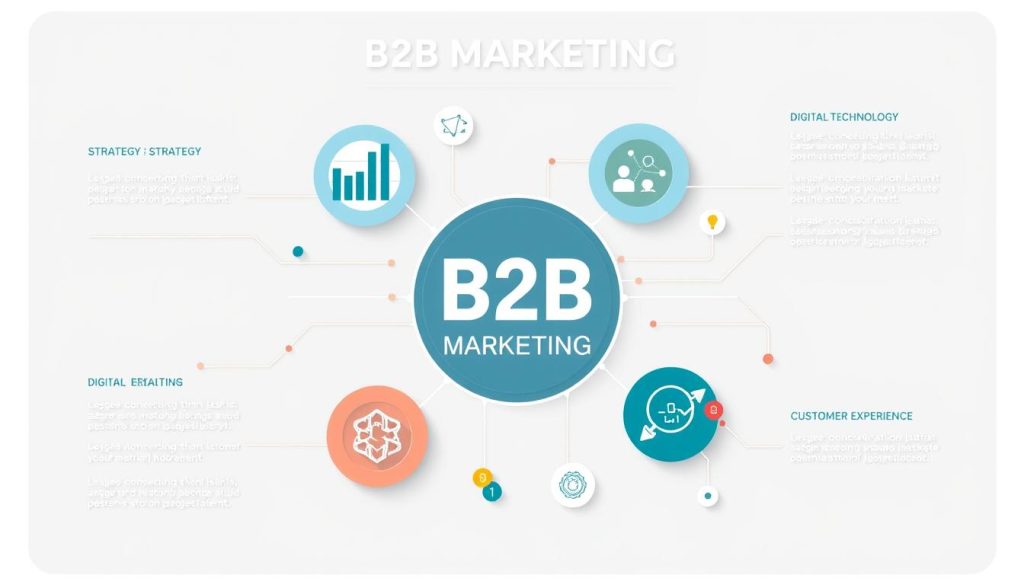B2B marketing is a fast-paced world where staying ahead is vital. Five key aspects now demand attention. These include data-driven decisions, account-based strategies, and content marketing excellence.
Customer relationship management and a strong digital presence are also crucial. These elements form the backbone of successful B2B marketing approaches.
This guide explores these essential aspects in depth. It offers insights and tips to boost your B2B marketing efforts. You’ll gain knowledge to navigate the changing B2B landscape effectively.
Key Takeaways
- Understand the evolution of modern B2B marketing and the impact of digital transformation
- Leverage data-driven decision-making to drive measurable success
- Explore account-based marketing strategies for targeted growth
- Develop content marketing excellence to engage and convert your audience
- Implement effective lead generation systems and customer relationship management
- Strengthen your digital presence and brand authority
- Align sales and marketing teams for maximum impact
Understanding the Evolution of Modern B2B Marketing
B2B marketing has changed dramatically in recent years. Digital technologies have revolutionized the industry. Content marketing for b2b and data-driven analytics now form the foundation of successful strategies.
Traditional vs. Digital B2B Marketing Approaches
B2B marketing once relied on face-to-face interactions and direct mail campaigns. Digital revolution has introduced a more dynamic approach to engaging potential customers.
Businesses now use content marketing for b2b and data-driven marketing analytics. These tools help create targeted content that resonates with their audience.
The Impact of Digital Transformation
Digital technologies have reshaped B2B marketing. Businesses now access vast data to inform their strategies and make data-driven decisions.
This shift has led to greater emphasis on personalization and automation. Companies now strive to deliver tailored and effective customer experiences.
Current Industry Trends Shaping B2B Marketing
Several key trends are shaping B2B marketing efforts. These include the rising importance of social media and marketing automation tools.
Account-based marketing strategies are also gaining traction. B2B marketers must adapt to these trends to remain competitive in the digital landscape.
| Traditional B2B Marketing | Digital B2B Marketing |
|---|---|
|
|

“The future of B2B marketing lies in the seamless integration of digital technologies and data-driven strategies to deliver personalized, engaging experiences for customers.”
5 Aspects of B2B Marketing You Can’t Ignore
B2B marketing success hinges on five critical aspects. These elements are vital for staying competitive and delivering outstanding results. Let’s explore account-based marketing strategies and effective customer relationship management.
Companies must focus on these key areas to thrive. They’ll help you create personalized experiences that resonate with your audience. Let’s dive into each aspect.
- Customer-Centric Approach: Put your customer at the heart of your strategy. Understand their pain points and needs. This builds lasting relationships and creates personalized experiences.
- Digital Transformation: B2B engagement has gone digital. Embrace new channels and leverage data-driven insights. Implement cutting-edge technologies to stay relevant and effective.
- Content Marketing Excellence: Deliver high-quality, value-driven content to attract and nurture your audience. Create thought-provoking articles and informative webinars. This positions your brand as a trusted industry leader.
- Sales and Marketing Alignment: Foster seamless collaboration between sales and marketing teams. Align goals, processes, and data. This synergy optimizes the customer journey and drives business growth.
- Adaptability and Innovation: The B2B landscape constantly evolves. Embrace agility and innovation to thrive. Stay ahead of trends and adapt to changing preferences. Continuously improve your strategies for long-term success.
Focus on these five key aspects to develop comprehensive marketing strategies. They’ll help deliver measurable results and position your brand for growth. Your company can thrive in the competitive marketplace.
“The future of B2B marketing is all about creating personalized, engaging experiences that truly resonate with customers. Those who embrace these five aspects will be well-positioned to outpace their competitors and drive exceptional business outcomes.”

Data-Driven Decision Making in B2B Marketing
Data-driven marketing analytics are vital for successful B2B strategies. Marketers can make informed decisions that drive real results using data. This approach is changing how B2B companies approach marketing.
By leveraging data, marketers identify key performance indicators and implement advanced analytics tools. This data-centric method helps companies achieve their marketing goals more effectively.
Key Performance Indicators for B2B Success
Measuring the right metrics is crucial for B2B marketing success. Essential KPIs to track include:
- Lead generation and conversion rates
- Website traffic and engagement
- Email campaign performance
- Social media reach and engagement
- Return on investment (ROI) for marketing campaigns
Analytics Tools and Implementation
Many analytics tools help B2B marketers harness data-driven insights. Google Analytics, Salesforce, and HubSpot offer features to track, analyze, and optimize marketing efforts.
Proper implementation of these tools is essential. It transforms raw data into actionable intelligence, guiding marketing strategies and decisions.
Measuring ROI and Campaign Performance
B2B marketing success depends on measuring and showing tangible results. Monitoring campaign performance helps marketers refine their tactics and allocate resources effectively.
Calculating ROI proves the value of marketing efforts to stakeholders. Data-driven analytics empower B2B companies to make smart decisions and drive growth.

“Data-driven marketing is not about collecting data for data’s sake, but rather about using data to make better business decisions and drive real results.” – *Marketing expert, John Doe*
Account-Based Marketing Strategies for Growth
Account-based marketing (ABM) is a powerful B2B approach for business growth. It targets high-value accounts with personalized marketing. ABM aligns sales and marketing teams for maximum impact.
To succeed with ABM, organizations must identify their target accounts. This involves analyzing data, trends, and buyer personas. By focusing on key accounts, businesses can use resources more effectively.
The next step is to personalize marketing campaigns for a tailored experience. This includes custom content and strategic account-based advertising. Understanding each account’s needs creates stronger relationships and more conversions.
Effective ABM requires close collaboration between sales and marketing teams. This alignment ensures a seamless customer journey. It allows for targeted, data-driven campaigns that support sales efforts.
Account-based marketing strategies can transform B2B organizations. They help drive targeted B2B lead generation and achieve sustainable growth. ABM helps companies stand out in a crowded marketplace.

Content Marketing Excellence in B2B
B2B marketing thrives on quality content. Valuable content engages audiences, nurtures relationships, and boosts business growth. Mastering content marketing for b2b establishes your brand as an industry authority.
It also enhances customer experience optimization for B2B clients. This approach sets you apart from competitors and builds trust.
Creating Value-Driven Content
Successful B2B content marketing starts with understanding audience needs. Research topics, formats, and channels that resonate with customers. Develop a strategy focused on providing genuine value.
Avoid simply promoting products or services. Instead, address customer pain points and offer solutions.
- Leverage industry insights and thought leadership to create educational, informative, and engaging content
- Experiment with a variety of content formats, such as blog posts, white papers, webinars, and video tutorials
- Ensure your content is optimized for both search engines and human readers
Content Distribution Channels
Distribute your content through the right channels. Use a mix of owned, earned, and paid media. This approach maximizes the reach and impact of your efforts.
- Publish content on your own website, blog, and social media platforms
- Reach out to industry influencers, publications, and partners for guest posting and co-marketing opportunities
- Utilize paid advertising, email marketing, and other promotional tactics to amplify your content’s visibility
Performance Tracking and Optimization
Content marketing requires ongoing improvement. Monitor performance using analytics tools and key performance indicators (KPIs). Refine your strategy based on insights gained.
This ensures you deliver maximum value to B2B customers. Continuous optimization keeps your content relevant and effective.
“Content marketing is a strategic marketing approach focused on creating and distributing valuable, relevant, and consistent content to attract and retain a clearly defined audience — and, ultimately, to drive profitable customer action.”
Mastering content marketing for b2b elevates your marketing efforts. It builds stronger customer relationships and drives sustainable growth. Customer experience optimization becomes a natural outcome of this approach.
Building Effective B2B Lead Generation Systems
A well-crafted lead generation system drives business growth in B2B marketing. High-quality b2b lead generation is vital for boosting sales and long-term success. Marketers need to focus on creating effective strategies.
Lead nurturing is key to successful lead generation. It involves sharing valuable content to build trust with potential customers. This approach helps guide prospects through the sales process.
Using sales enablement tools can improve collaboration between marketing and sales teams. These tools streamline the lead nurturing process and increase efficiency.
Lead qualification is another crucial factor in effective lead generation. It helps identify the most promising leads for better resource allocation. This process can significantly improve conversion rates.
Advanced analytics and scoring models aid in distinguishing qualified leads. These tools help marketers determine which leads need more nurturing. They also highlight high-potential prospects for immediate action.
- Implement a robust lead nurturing strategy to build trust and authority
- Utilize sales enablement tools to align marketing and sales efforts
- Develop lead scoring and qualification processes to prioritize high-value prospects
Data-driven insights are essential for constructing a solid B2B marketing foundation. Balancing personalized outreach with automated processes is key. This approach cultivates a steady stream of qualified leads.
Successful B2B marketers focus on sustainable growth and profitability. They use strategies that drive meaningful business impact. The goal is to create a system that consistently generates valuable leads.
“Effective lead generation is the lifeblood of any successful B2B organization. It’s not just about casting a wide net, but about identifying and nurturing the right prospects to drive genuine business opportunities.”
Customer Relationship Management Essentials
Effective customer relationship management (CRM) is crucial for B2B marketing success. It helps businesses build strong, lasting relationships with clients. By focusing on customer experience optimization, companies can drive growth and retention.
CRM Implementation Best Practices
A robust CRM system transforms customer interactions. To implement CRM effectively, define clear goals aligned with business objectives. Choose a platform that integrates with your existing technology stack.
Provide thorough training to ensure user adoption and proficiency. Regularly review and optimize CRM data and processes for best results.
Nurturing Customer Relationships
Strong customer relationships drive loyalty and repeat business. Use personalized communication and outreach to connect with clients. Offer timely and responsive customer support to address their needs.
Provide valuable, educational content and resources to keep customers engaged. Actively seek and implement customer feedback to improve your services.
Long-term Customer Retention Strategies
Retaining customers is the ultimate goal of effective customer relationship management. Develop a deep understanding of customer needs and pain points. Offer tailored product or service enhancements to meet their specific requirements.
Foster a culture of continuous improvement and responsiveness within your organization. Recognize and reward loyal customers through exclusive programs to strengthen their commitment.
Customer relationship management and customer experience optimization are key to B2B marketing success. These practices help unlock your customer base’s full potential. By implementing them, you can drive long-term growth and profitability.
Sales and Marketing Alignment Strategies
Aligning sales and marketing teams is vital for B2B growth. This harmony allows organizations to use sales enablement tools effectively. It also helps develop insightful buyer persona development strategies.
Buyer personas are key to aligning sales and marketing. These profiles provide insights into customer pain points and behaviors. They help teams craft personalized messages that resonate with prospects.
- Conduct in-depth market research to gather data on your target audience’s demographics, interests, and pain points.
- Collaborate with sales representatives to gather first-hand insights from customer interactions.
- Regularly update and refine your buyer personas to ensure they accurately reflect the evolving needs of your customers.
Sales enablement tools boost synergy between sales and marketing. These technologies streamline the sales process. They provide resources, content, and analytics for effective prospect engagement.
Aligning these tools with marketing strategies ensures a cohesive customer experience. This approach creates a seamless journey for potential clients.
| Sales Enablement Tool | Key Benefits |
|---|---|
| Customer Relationship Management (CRM) Software | Centralized customer data, streamlined communication, and enhanced lead management |
| Content Management System (CMS) | Easy access to marketing collateral, sales presentations, and other valuable resources |
| Sales Engagement Platforms | Automated outreach, real-time analytics, and personalized customer engagement |
These strategies foster collaboration between sales and marketing teams. This teamwork can unlock new levels of growth. It can also significantly boost customer satisfaction.
“Aligning sales and marketing is the key to unlocking sustainable growth in the B2B landscape. By empowering both teams with the right tools and insights, businesses can create a seamless customer experience that drives long-term success.”
Digital Presence and Brand Authority
A strong online presence is vital for B2B success. Building trust through digital channels is key. Leveraging social proof and developing thought leadership can boost brand credibility and attract quality leads.
Building Trust Through Digital Channels
A user-friendly website is crucial for a solid digital presence. Optimize customer experience with easy navigation and engaging content. This builds trust with your target audience.
Stay active on social media platforms. Respond promptly to messages and comments. This can strengthen your brand’s online reputation.
Social Proof and Testimonials
Showcase positive customer testimonials on your website and digital channels. Include case studies to demonstrate your brand’s reliability. This shows potential customers the value you offer.
Thought Leadership Development
Position your brand as an industry thought leader. Create insightful and informative content for B2B audiences. This establishes your expertise and attracts high-quality leads.
Valuable content helps position your brand as a trusted partner. It shows potential customers that you understand their needs and challenges.




